Overclocking Intel’s Core i7-7700K: Kaby Lake Hits The Desktop!
Intel's new Kaby Lake CPU delivers on the clock speeds the company promised, but the power consumption and thermal characteristics were disappointing based on a leaked sample of the new chip we received and tested weeks ahead of its official launch.
Core i7-7700K Preview
The greatest gift a review editor can receive is unexpected hardware, especially when that hardware is an anticipated CPU. What would you do with an early sample of Intel’s next-gen Desktop CPU? You would CPU overclock, of course! So would I.
[Editor's Note: Intel declined to comment on our general findings. Although the CPU we received is not marked as an engineering part, we cannot confirm with certainty that it is a retail sample.]
I downloaded the latest Kaby Lake firmware for my most recently-tested Z170 motherboard sample and began running benchmarks.
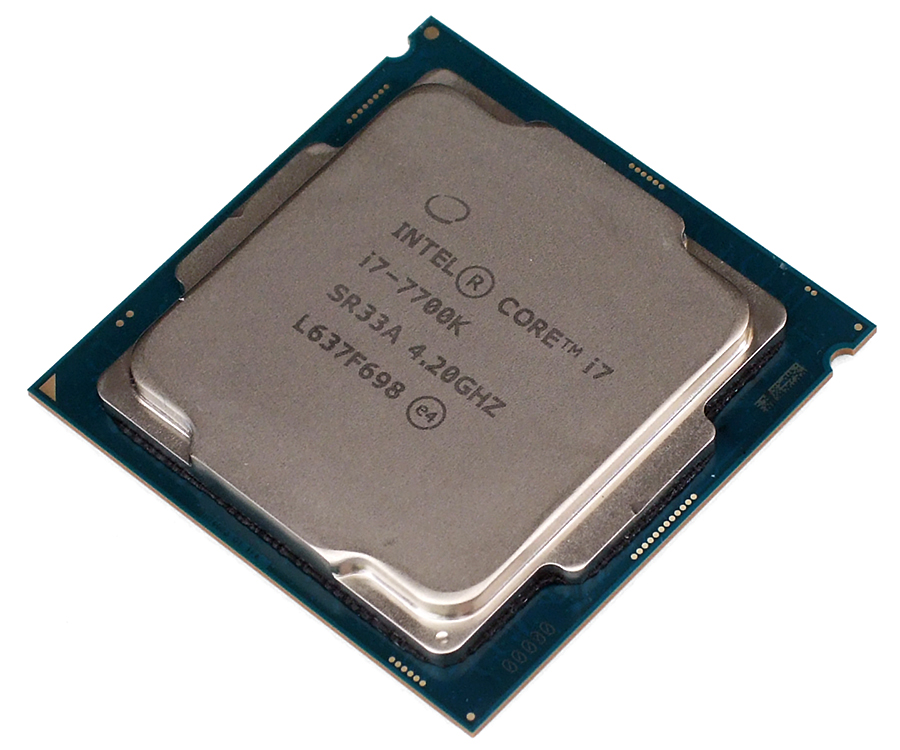
That’s right, I said Z170. It turns out that while the next generation of motherboard may provide minor feature enhancements compared to the current generation, they’re both compatible with the new CPUs. That’s certain to be a big relief to overclockers who recently burned their Skylake-based processors, and it makes sense because of Intel’s recently-adjusted Tick-Tock-Tock strategy of releasing a new die process (Broadwell), followed by a new architecture (Skylake), followed by a process refinement or optimization (rather than another new process). To the point: Kaby Lake is a revision of Skylake.
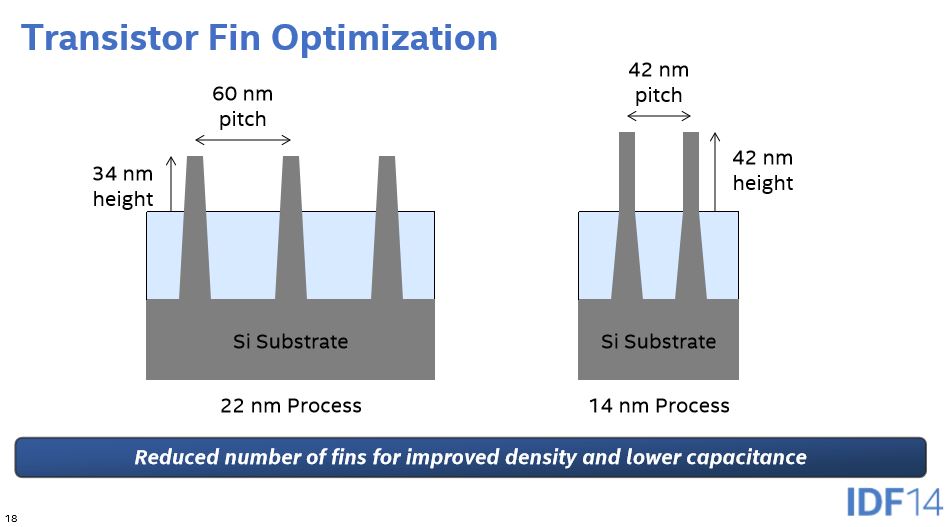
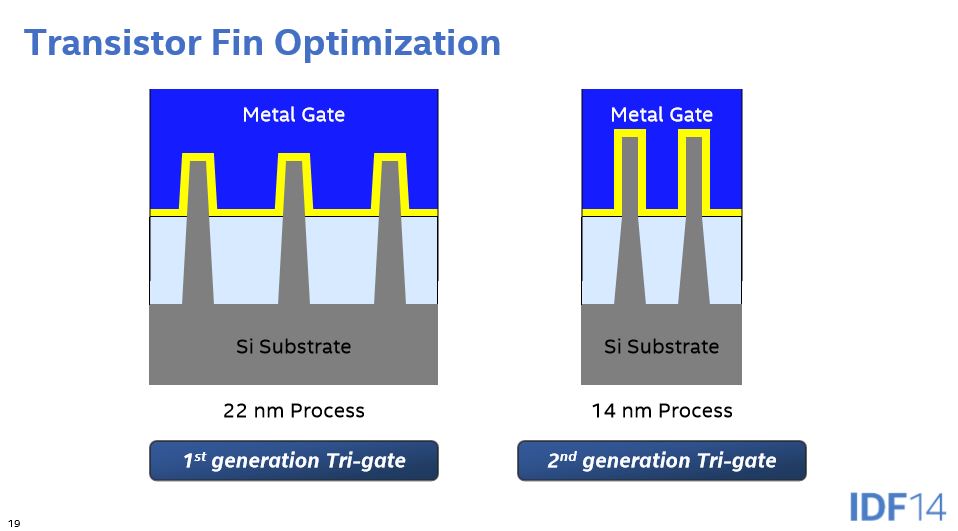
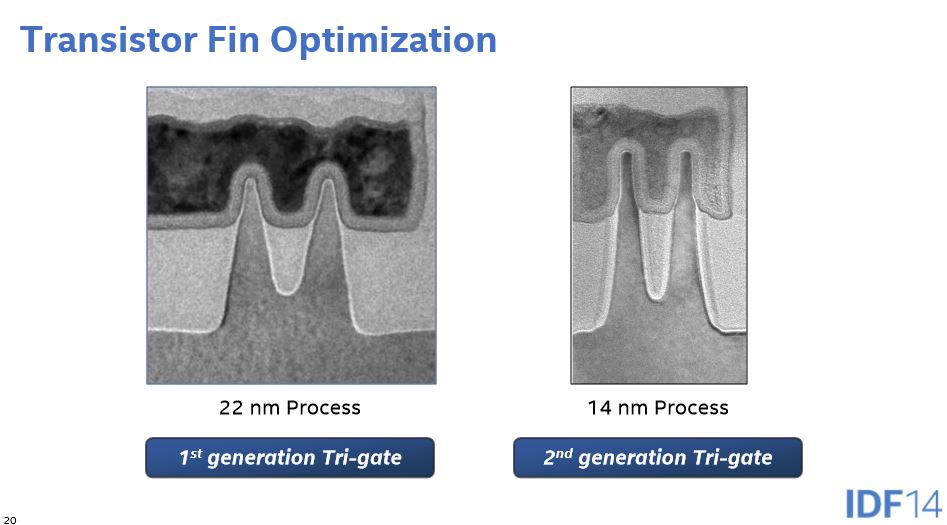

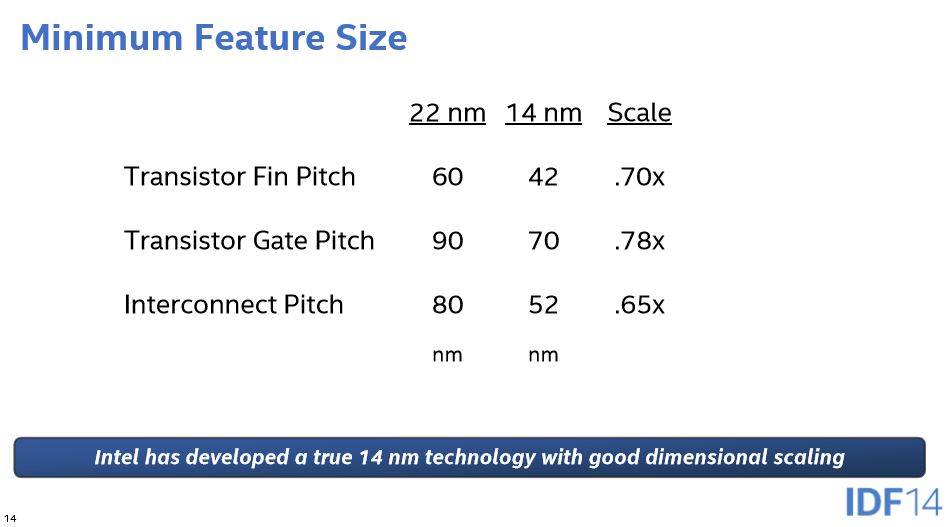
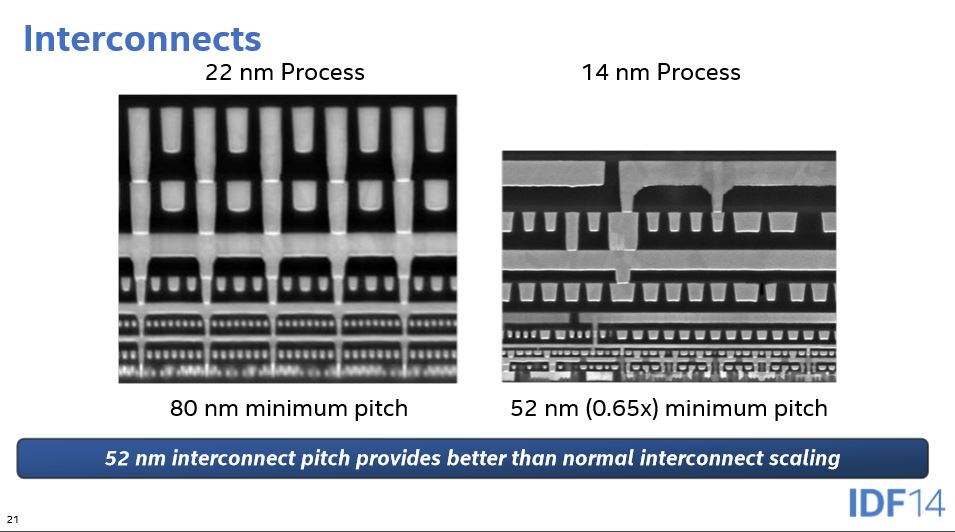
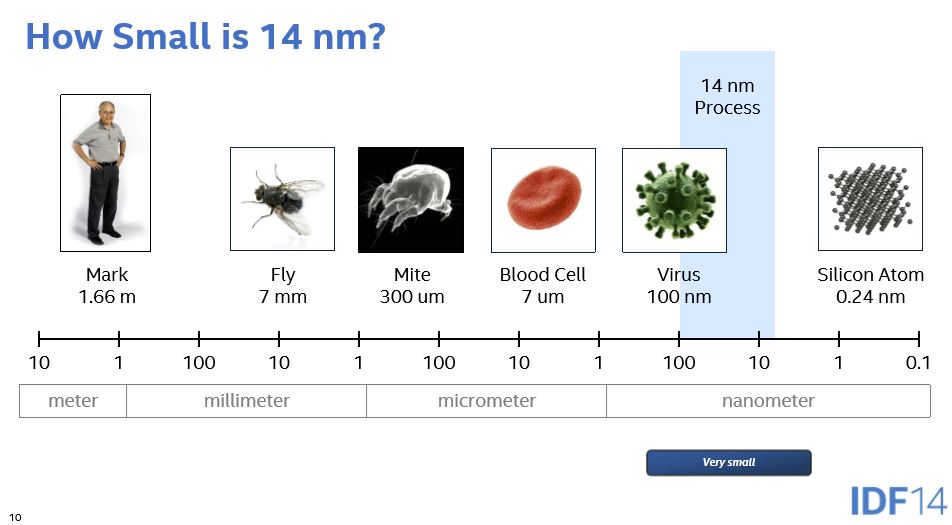
Intel says that taller transistor fins and wider gate pitch endow its 14nm+ process with an additional 300 to 400 MHz clock rate capability. That’s huge if it turns out to be true. As a motherboard reviewer, it’s also one of the first things I wanted to test!
| Kaby Lake | ||||||
| Model | Cores/Threads | Cache | Baseline Frequency | Max Turbo Boost | TDP | IGP |
| Core i7-7700K | 4/8 | 8MB | 4.20 GHz | 4.50 GHz | 95W | 630 |
| Core i5-7600K | 4/4 | 6MB | 3.80 GHz | 4.00 GHz | 95W | 630 |
| Core i7-7700 | 4/8 | 8MB | 3.60 GHz | 4.20 GHz* | 65W | 630* |
| Core i5-7600 | 4/4 | 6MB | 3.50 GHz | 4.00 GHz* | 65W | 630* |
| Core i5-7500 | 4/4 | 6MB | 3.40 GHz | 3.80 GHz* | 65W | 630* |
| Skylake | ||||||
| Core i7-6700K | 4/8 | 8MB | 4.00 GHz | 4.20 GHz | 91W | 530 |
| Core i5-6600K | 4/4 | 6MB | 3.50 GHz | 3.90 GHz | 91W | 530 |
| Core i7-6700 | 4/8 | 8MB | 3.40 GHz | 4.00 GHz | 65W | 530 |
| Core i5-6600 | 4/4 | 6MB | 3.30 GHz | 3.90 GHz | 65W | 530 |
| Core i5-6500 | 4/4 | 6MB | 3.20 GHz | 3.60 GHz | 65W | 530 |
Intel accidentally leaked a little information about its desktop Kaby Lake CPUs in a document concerning other variations of the processor. What the company didn’t mention was the graphics version or Intel Turbo Boost frequencies. It’s because we’ve seen the Core i7-7700K and Core i5-7600K in action that we can provide that data for those two processors, and the asterisks in the chart indicate guesses derived from Intel’s previous models. We can’t say much about the revised Intel HD Graphics 630 without access to Intel documentation, which should be forthcoming when the company provides its usual information exchange closer to launch time; and none of our programs can pick out any pertinent information.
We’re also told that process improvements will enhance efficiency, but there is no free lunch. Intel didn’t change the core micro architecture between Skylake and Kaby Lake, and our motherboard didn’t even read a voltage reduction for the Core i7-7700K, compared to the Core i7-6700K. Our motherboard set the Core i7-7700K to 1.30V at its 4.50 GHz max turbo, whereupon it behaved exactly the way we’d expect our Core i7-6700K to act when overclocked to 4.50 GHz at 1.30V.
Stay On the Cutting Edge: Get the Tom's Hardware Newsletter
Get Tom's Hardware's best news and in-depth reviews, straight to your inbox.
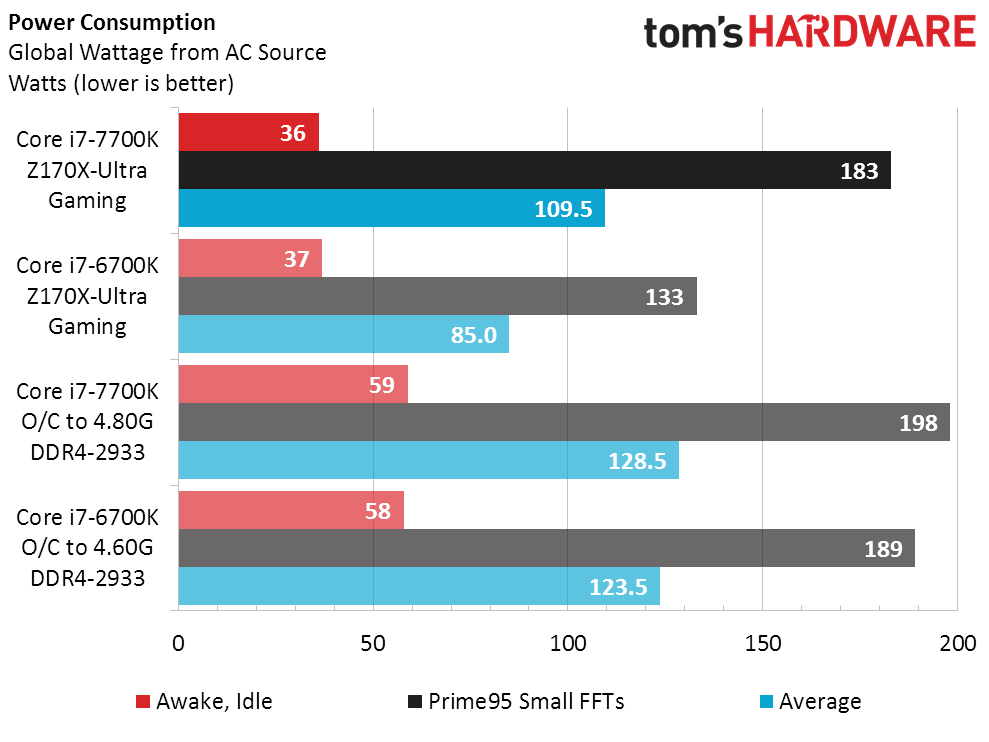
This particular motherboard dropped the full-load CPU voltage by around 20mV and the maximum full-load multiplier to 42x after I changed from firmware defaults to manual configuration and then back to automatic settings. It did this twice, both times after I initially used the CLR_CMOS jumper. Maximum power draw then dropped to 141W when turbo boost was disabled (bringing us down to the default 4.20 GHz; see chart below). Idle energy also dropped to 24W after several hours, but an idle period of that length exceeds normal test procedure.
The “no free lunch” statement still applies since 141W is more than 133W, but the only way I’ll reach an accurate conclusion about how much more power the higher 4.50 GHz frequency requires is to compare more boards. Update: Our first follow-up test has already confirmed a lower, 25W full-load power delta between the Core i7-7700K and Core i7-6700K when using a different motherboard. The new generation of motherboards that launch with this CPU will be the best boards to use for those tests, and we’ll have a batch of them ready when the NDAs of those manufacturers expire.
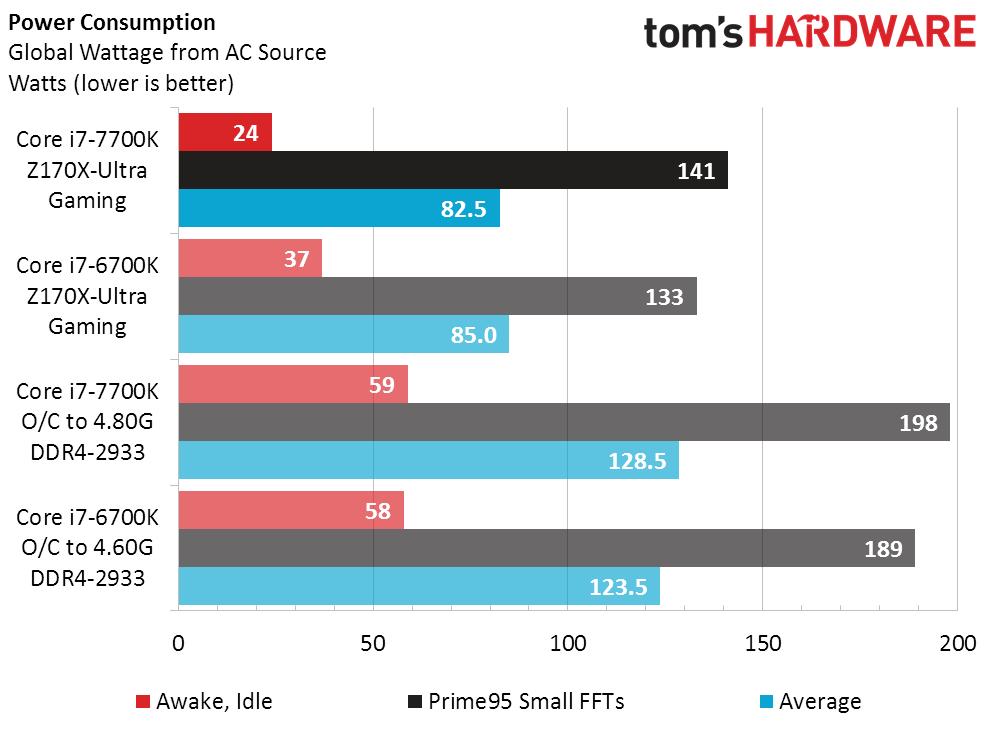
The power charts reveal my spoilers. This Core i7-7700K sample can be overclocked on this motherboard to 4.80 GHz at 1.30V, compared to the Core i7-6700K’s 4.60 GHz. I used Gigabyte’s GA-Z170X-Ultra for this test because it was my most recent review sample. The leftover chart tidbit — that I set the memory to DDR4-2933 — is due to this particular motherboard’s difficulty in achieving DDR4-3200 with four of my G.Skill DDR4-3600 modules installed.
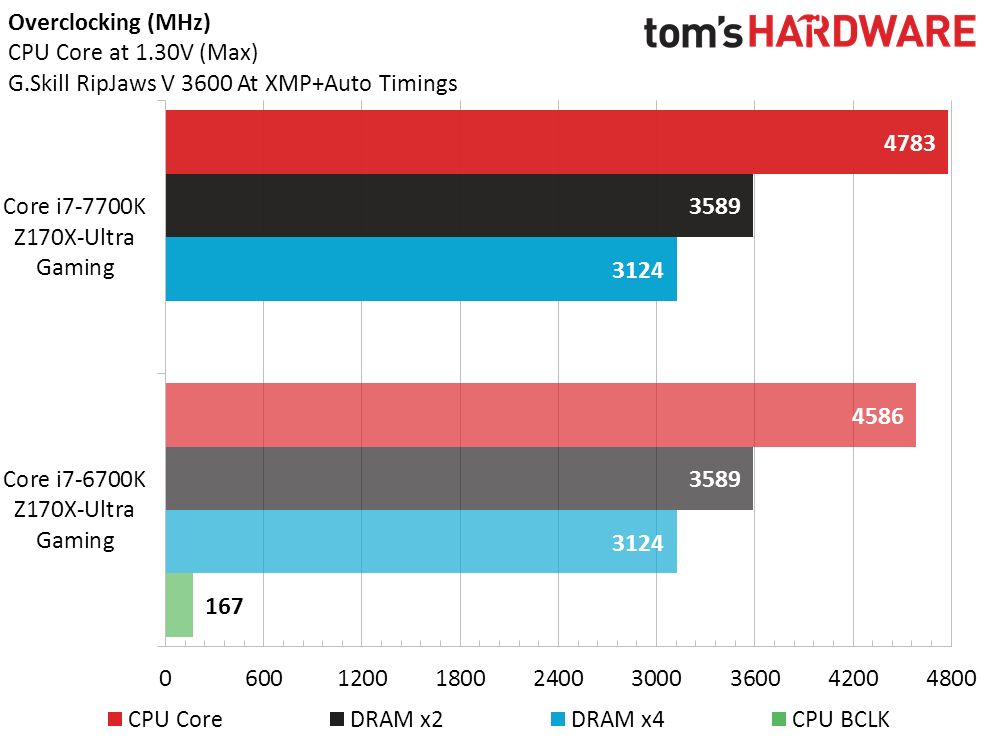
The actual core overclock results of 4.78 GHz and 4.59 GHz are caused by the Z170X-Ultra’s oddball 99.65 MHz BCLK; the DRAM overclocks are identical due to motherboard limits; and I eventually gave up in frustration when trying to adjust the CPU BCLK with the new CPU. I’m sure a few of you Gigabyte fanatics have experienced the same BCLK stickiness.
The limits of the test board should leave plenty of excitement for future reviews, where new boards and memory may reveal new DRAM and BCLK overclocking heights! For now, I’m simply satisfied to find a solid core clock increase.
MORE: Best CPUs
MORE: All CPU Content
-
sarinaide The results are kind of disappointing for a 200mhz clock bump and 200mhz overclock head room you get twice the heat and power used, and 10% at best gains but more or less less than 5%. Sorry but maybe I missed something but that is not very good.Reply -
Daniel Ladishew Why would you use a motherboard with known issues (BLCK and RAM timings) to test a brand new CPU? It seems like you would have been better served taking the extra time to switch out to a motherboard that actually performs as expected with all previous hardware, so your baseline isn't questionable. If I were Intel, I wouldn't respond to these results either. Please test again with a better performing motherboard.Reply -
ComputerSecurityGuy Does it really deserve the exclamation point?Reply
Kaby Lake has the expected identical IPC to Skylake but slightly higher clocks. The thermal figures are surprising, I would have thought that they wouldn't have done that bad.
Anyone with Skylake shouldn't bother upgrading. As expected, Intel has produced a filler chip simply because their 10nm fab is taking longer than expected. -
elbert Looks like the 14nm+ is real given +200mhz overclock gain. Now just wonder what the leaked i3-7350K can get in overclock.Reply -
MusenMouse Maybe Intel's letting AMD get a free punch before they roll them next round :). Anyways maybe Kaby Lake will be like the Broadwell lineup, fleeting and in small numbers.Reply -
logainofhades Reply18934399 said:Does it really deserve the exclamation point?
Kaby Lake has the expected identical IPC to Skylake but slightly higher clocks. The thermal figures are surprising, I would have thought that they wouldn't have done that bad.
Anyone with Skylake shouldn't bother upgrading. As expected, Intel has produced a filler chip simply because their 10nm fab is taking longer than expected.
Depends on what skylake they have. An i3 6100 user may be interested in an i5 7500 or an i7 7700. -
ubercake At max graphic settings, gaming performance differences are negligible.Reply
I'd like to see the 7700K versus a Sandy Bridge with gaming. It's probably not a whole lot different since the year 2011.
Hopefully AMD's Zen lives up to the hype "bulldozer" never did because Intel has no competition right now. -
Jamie_Lannister Im going to wait for cannonlake. For now I'll stick with my good old Ivy Bridge i5 3570k.Reply -
Aristeid3s @ubercake, There are quite a few pieces of content out there showing a skylake i5 vs a 2500k. I don't remember specifics, but it was a pretty handy increase.Reply
